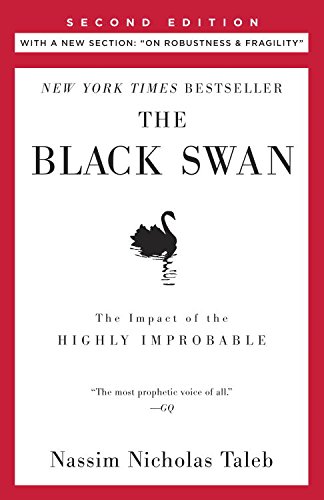By Nassim Nicholas Taleb – A Long-Form Summary
Introduction: A World Shaped by the Unexpected
In a world increasingly obsessed with prediction and control, Nassim Nicholas Taleb’s The Black Swan delivers a bold, unsettling idea:
The most important events in our lives are not predictable—they’re Black Swans: rare, high-impact, and retrospectively explainable but never foreseeable.
Published in 2007 (just before the 2008 financial crash), The Black Swan is a cornerstone of Taleb’s Incerto series and has reshaped how we think about uncertainty, probability, and risk. Part philosophy, part polemic, and part personal memoir, the book invites us to embrace uncertainty instead of denying it.
What Is a Black Swan?
A Black Swan event has three defining traits:
- Rarity – It lies outside the realm of regular expectations.
- Extreme impact – It has massive consequences.
- Retrospective predictability – After it happens, people rationalize it as if it was predictable.
Examples include:
- 9/11 terrorist attacks
- The 2008 financial crisis
- The rise of the internet
- COVID-19 pandemic
Taleb argues that Black Swans are far more frequent than we think—and that modern systems, including economics and science, are poorly equipped to deal with them.
The Problem with Prediction
At the heart of Taleb’s critique is our overconfidence in prediction. He takes aim at:
- Economists who use flawed models.
- Scientists who ignore outliers.
- Business experts who claim foresight after the fact.
Taleb argues that most forecasting models are built on the assumption that the world behaves according to Bell Curve-style “normal” distributions. But real life doesn’t follow neat patterns—it’s messy, chaotic, and full of fat tails: extreme events that occur more often than the models predict.
💡 Key takeaway: We are blind to the true complexity and randomness of the world.
Mediocristan vs. Extremistan
To explain this better, Taleb divides the world into two domains:
Mediocristan
- Predictable, average-driven domains.
- Examples: human height, calorie intake, car speed.
- Extremes don’t matter much.
Extremistan
- Domains where a single event can completely reshape the whole.
- Examples: book sales, financial markets, wealth, internet virality.
- One outlier (e.g., J.K. Rowling, Amazon, Bitcoin) can dominate.
💡 Key insight: Most of what matters in modern life comes from Extremistan.
Our Cognitive Blind Spots
Taleb dives deep into the psychological biases that keep us blind to Black Swans:
- Confirmation Bias: We look for evidence that supports our beliefs and ignore what contradicts them.
- Narrative Fallacy: We love stories and construct neat narratives after the fact, making the random seem logical.
- Survivorship Bias: We see the winners (e.g., successful startups) and ignore the graveyard of failures.
- Ludic Fallacy: We confuse academic, rule-based models with messy, real-life randomness.
💡 Takeaway: Our brains are wired for order and simplicity, but the world runs on chaos and complexity.
The Scandal of Prediction: Why Experts Fail
Taleb is especially scathing toward “experts”, particularly in economics and finance, who pretend to understand and forecast complex systems.
He cites research showing that experts are often no better at predicting the future than random guesses—yet they maintain their authority because people crave certainty.
💡 Key point: Forecasting is often just storytelling dressed up as science.
Embracing Antifragility (Even Before That Book)
Though Taleb elaborates on “Antifragility” in a later book, the seeds are here in The Black Swan: systems should be designed to benefit from disorder rather than collapse under it.
This means:
- Emphasizing robustness over optimization.
- Experimenting and failing small rather than risking catastrophic collapse.
- Preparing for the unpredictable, rather than trying to prevent it.
How to Thrive in a Black Swan World
So what do we do in a world governed by Black Swans?
Taleb offers several strategies:
- Avoid the illusion of certainty: Don’t bet everything on one outcome.
- Barbell Strategy: Keep most of your investments safe (e.g., bonds) while putting a small amount in high-risk, high-reward bets.
- Learn to love negative knowledge: Focus on what not to do.
- Tinker and experiment: Use trial and error instead of top-down planning.
- Be skeptical of experts: Especially those who can’t show skin in the game.
💡 Practical lesson: Prepare for volatility, and structure your life to survive and even benefit from shocks.
The Philosophical Core: Humility and Openness
Beyond finance and forecasting, Taleb is making a philosophical argument: our world is far more complex than we can comprehend. Instead of forcing false certainty, we should:
- Accept what we don’t know.
- Stay humble in the face of randomness.
- Develop a deeper respect for uncertainty and unpredictability.
Criticism and Controversy
While widely praised for its originality and foresight, The Black Swan has critics:
- Some find Taleb’s writing arrogant and abrasive.
- Others argue that his critiques are too sweeping, dismissing entire disciplines.
- Still, his insights have influenced fields from risk management to psychology to decision science.
Final Thoughts: Why Black Swans Matter More Than Ever
In a world rocked by pandemics, market crashes, and sudden breakthroughs, Taleb’s insights are more relevant than ever. The Black Swan reminds us that:
- Uncertainty is inevitable.
- The biggest risks are often invisible until they strike.
- Robust systems are built not on prediction, but on adaptability.
Rather than trying to forecast the next Black Swan, Taleb urges us to build lives, organizations, and societies that are ready for the unknown.

The Black Swan: Second Edition: The Impact of the Highly Improbable
Nassim Nicholas Taleb


